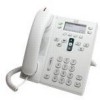Cisco 6941 Administration Guide - Page 73
Applications > Admin Settings > Security Configuration, Update, Submit
 |
UPC - 882658277801
View all Cisco 6941 manuals
Add to My Manuals
Save this manual to your list of manuals |
Page 73 highlights
Chapter Configuring Security on the Cisco Unified IP Phone Before You Begin Make sure that the appropriate Cisco Unified CM and the Certificate Authority Proxy Function (CAPF) security configurations are complete: • The CTL file should have a CAPF certificate. • On Cisco Unified Communications Operating System Administration, verify that the CAPF certificate has been installed. • The CAPF is running and configured. Refer to Cisco Unified Communications Manager Security Guide for more information. To manually configure an LSC on the phone, perform these steps: Procedure Step 1 Obtain the CAPF authentication code that was set when the CAPF was configured. Step 2 From the phone, choose Applications > Admin Settings > Security Configuration. Note You can control access to the Administrator Settings Menu by using the Settings Access field in the Cisco Unified Communications Manager Administration Phone Configuration window. For more information, see the Cisco Unified Communications Manager Administration Guide. Step 3 Step 4 Step 5 To unlock settings, see the "Unlocking and Locking Options" section on page 4-3. Scroll to LSC and press the Update softkey. The phone prompts for an authentication string. Enter the authentication code and press the Submit softkey. The phone begins to install, update, or remove the LSC, depending on how the CAPF was configured. During the procedure, a series of messages appears in the LSC option field in the Security Configuration menu, so you can monitor progress. The LSC install, update, or removal process can take a long time to complete. You can stop the process at any time by pressing the Stop softkey from the Security Configuration menu. (Settings must be unlocked before you can press this softkey.) You can verify that an LSC is installed on the phone by choosing Administrator Settings > Phone Information and ensuring that the LSC setting shows Installed. Related Topic Understanding Security Features for Cisco Unified IP Phones, page 1-14 Cisco Unified IP Phone 6921, 6941, 6945, and 6961 Administration Guide for Cisco Unified Communications Manager 8.5 (SCCP and SIP) OL-23769-01 3-17















